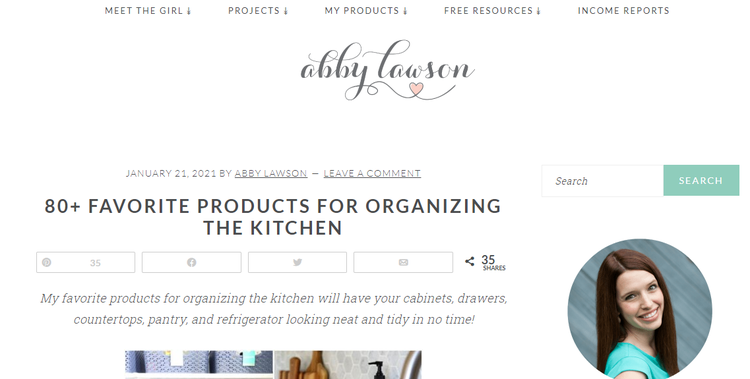The Complete Small Business Guide to Affiliate Marketing
Passive income is a dream for many people who want to make money while they sleep, and affiliate marketing is one way to accomplish this dream.
When it’s done correctly, commissions just show up in your account overnight. There’s a bit of work to get started with affiliate marketing, but once it’s in place, affiliate income is very passive.
Affiliate marketing can be a great way for new entrepreneurs to learn how to sell things online. It gives them the opportunity to test out different marketing strategies and find out what works in their niche. Small business owners with a content marketing strategy can add affiliate links to start generating additional revenue.
Overview: What is affiliate marketing and how does it work?
Affiliate marketing is the process of earning a commission by promoting other people’s products. The process is simple. You find a product that you like, sign up to become an affiliate, promote the product with your unique affiliate link, and earn a commission for the sales that are made through that link.
What are affiliate links?
An affiliate link is a unique URL that’s assigned to a specific affiliate. It includes the affiliate’s ID and tracks the sale. This allows the affiliate to get credit for the traffic they send to the website. If a visitor clicks the affiliate link and buys the product, the affiliate will earn a commission.
Examples of popular affiliate marketing websites
There are popular affiliate marketing websites you may have already visited without realizing that’s what they are. Many of them offer quality content to attract visitors. Affiliate marketing websites tend to stay within a particular niche and publish content regularly. This attracts people who have a strong interest in the subject and are likely to buy related products.
Just a Girl and Her Blog
This blog is written by Abby Lawson, who sells stuff through the Amazon affiliate program. She writes about what interests her the most, and her content focuses on DIY projects, crafts, and organization. Lawson has shared her income reports and makes more than $40,000 per month, with 75% of that coming from affiliate marketing.

Abby Lawson reviews organizing products on her blog. Image source: Author
Dating Advice
Datingadvice.com is a fun dating website that focuses on providing expert advice to singles and answering real-life dating questions. Their main goal is to help people improve their dating skills and find the best dating site for their needs. Dating Advice makes its money by referring people to paid dating websites, such as eHarmony and Match.

Dating Advice provides its readers with tips on dating, as well as dating service recommendations. Image source: Author
100 Days of Real Food
100 Days of Real Food is a great example of a successful niche Amazon affiliate website. It’s similar to a food blog that recommends certain products. The owner, Lisa Leake, has become an authority on real food and uses the blog to sell her cookbook.

The 100 Days of Real Food blog sells a cookbook through its website and generates affiliate income with Amazon product recommendations. Image source: Author
Advantages of becoming an affiliate marketer
Affiliate marketing can help you generate additional income streams and form partnerships with other businesses that can provide you with referral commissions. The following are some of the benefits of affiliate marketing:
- Additional income without creating new products
- No startup costs
- Build brand awareness in your niche
- Improve SEO
- Create valuable partnerships
- Scale your business
Downsides of affiliate marketing
Affiliate marketing isn’t for everyone, and there are some downsides. Some businesses just don’t have a business model that can accommodate an affiliate marketing campaign. Here are some downsides to affiliate marketing:
- Not your product or program: Affiliate marketing commissions and rules are dependent on the other company. The company can lower its commissions at any time.
- You don’t control the competition: Talented affiliate marketers in your niche are very competitive. You may find it’s difficult to rank for keywords that would promote products.
- Can’t establish a customer base: Once you make a referral, a customer might not make a purchase from you again. If they leave your website through an affiliate link, you may never market to them again unless they sign up for your email list first.
- No guaranteed revenue: Affiliate marketing is not easy. It can take a bit of time to build up a following and earn referral commissions unless you run ads. There’s no guarantee of income.
- Entrepreneurship isn’t for everyone. Some people are not self-starters and prefer being given instructions about what to create. Affiliate marketing is more for the people who can work on their own and test out different content ideas.
How to get started making money online with affiliate marketing
Getting started with affiliate marketing can take only a few days. You simply need to decide on the products that you want to promote and apply to become an affiliate. Once you’ve been approved, you can get started promoting products and earning a commission.
1. Choose your niche
If you already have a business or product that you sell, you will go into that niche. If you’re starting from scratch, you will need to brainstorm different things you’re interested in promoting. Narrowing your niche allows you to create content and build a following. When you focus on one topic, you begin to be seen as an expert in it. The more specific you can be about your niche, the better.
2. Choose your products
Select the products you want to promote. Remember that you want your audience to trust you, so don’t lose their trust by promoting something that doesn’t fit your brand or values. It’s best to select products you would recommend to a friend. Consider your brand’s unique selling proposition and choose products that complement it.
Research the products before you promote them. Product reviews should be honest and explain the benefits and pitfalls of the product. Your audience will appreciate it if you are honest about your full experience.
Select products in your niche. People will be confused if you run a cooking blog and start promoting hiking gear. Don’t get drawn into promoting irrelevant products because they have a high affiliate commission.
3. Research affiliate programs
There are two different ways to sign up for affiliate programs. Some companies run their own program, while others are run through a third party that manages multiple companies’ affiliate programs.
If you already love a brand’s products and regularly talk about them to your friends, go to the brand’s website and look for a link that says “affiliate program.” Read the affiliate agreement and determine if it suits your business.
Multi-brand affiliate programs allow you to take advantage of several programs through their service. ShareASale and CJ Affiliate are examples of multi-brand affiliate programs. Each brand will offer different commissions, so make sure that you read the details.
Keep the following questions in mind as you research each opportunity:
- What percentage of the sale will I receive?
- Is it worth my time as a content creator?
- Does the affiliate program offer additional marketing resources to help promote their product?
It’s easy to become an affiliate. Simply sign up. The company will review your website and determine if you’re a good fit. Once you’re approved, the company will provide you with affiliate links and, in some cases, marketing material for their products.
4. Build a blog or website
People don’t click on affiliate links that don’t have any context. A blog or website gives you the opportunity to build trust with consumers. You can guide them through the customer journey with blog posts and landing pages.
Small businesses often already have a website to use for affiliate marketing. Most e-commerce platforms allow you to create blog posts and web pages that include affiliate links.
5. Start promoting affiliate products
Once you have a website and affiliate links, you can get started. Start promoting the links with ads that lead to landing pages, or build a blog and write product reviews or informative content that will help consumers decide whether they want to purchase the product.
5 best practices when selling online as an affiliate marketer
Some affiliate marketers quickly fail because they don’t follow best practices. They may post links without much information about them or become annoying by constantly posting the same link over and over to their followers. Selling online requires building good relationships with customers.
1. Focus on value
Affiliate marketing depends on building trust with your audience and providing them with value. Once your audience trusts you, they will naturally be curious about your product recommendations.
2. Don’t spam your affiliate link
The fastest way to get someone to unfollow you is to constantly post the same affiliate link. Most people aren’t looking to make a purchase. They’re looking for information on how to solve their problems. When someone sees that you’re always posting affiliate links, they know you’re trying to make a sale.
Instead, write a review about the product. People interested in buying a product want honest opinions from other people who have tried it.
3. Only promote high-quality products
Low-quality products will not only damage your relationship with the consumer, but you may end up with a bunch of returns and refunds. There are tons of low-quality offers. They show up as get-rich-quick schemes and male-enhancement drugs. When email service providers see these sites, your reputation can be permanently damaged.
4. Send valuable emails
Your emails will help to build a relationship with the consumer. Make sure that you’re providing value with each email, so write emails that will benefit your audience. Consistently providing value sets you apart as an expert in your field.
5. Build relationships
Produce emails and blog content that show your personality. Most people want to feel a connection. Otherwise, you’re simply a name in their inbox. Help your customers understand that you have a passion for your work, and you want to help them with their problems. You’re a person just like them with dreams and ambitions. If your audience connects with you, they’re more likely to follow your recommendations.
Affiliate marketing adds extra value to your business
Affiliate marketing can be included as a component of any small business that has a website. It can enhance your online store marketing. Partnering with other companies that offer complementary services and products provides your customers with additional value.
For example, a paint company can sell paint, but their customers will also need to purchase paint brushes, ladders, and drop cloths. Including reviews about complementary products will help to build your website, increase your value, and provide an additional passive revenue stream.
Alert: our top-rated cash back card now has 0% intro APR until 2025
This credit card is not just good – it’s so exceptional that our experts use it personally. It features a lengthy 0% intro APR period, a cash back rate of up to 5%, and all somehow for no annual fee! Click here to read our full review for free and apply in just 2 minutes.
Our Research Expert
We're firm believers in the Golden Rule, which is why editorial opinions are ours alone and have not been previously reviewed, approved, or endorsed by included advertisers. The Ascent does not cover all offers on the market. Editorial content from The Ascent is separate from The Motley Fool editorial content and is created by a different analyst team.
Related Articles
View All Articles